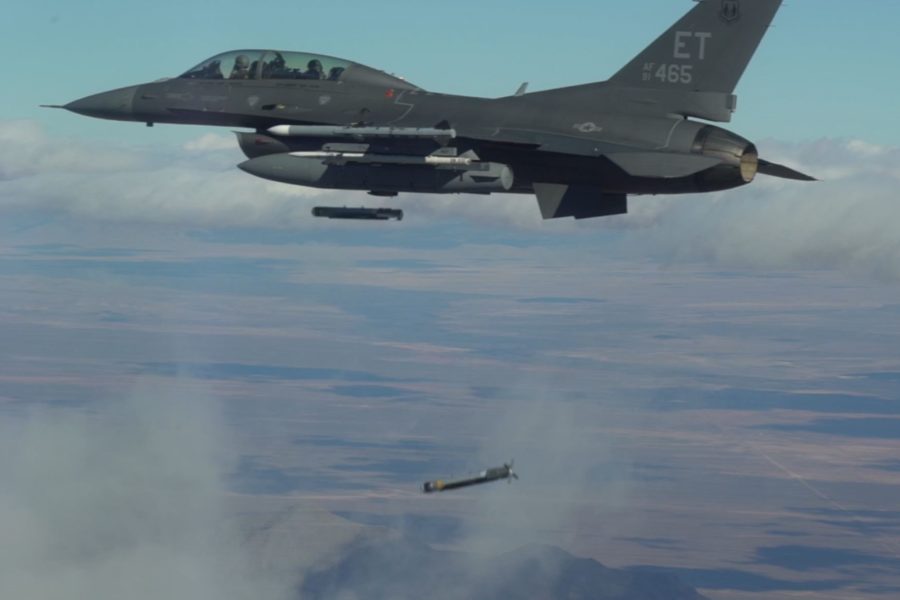Two of the Air Force’s most prominent “Vanguard” technology incubator programs—Skyborg and Golden Horde—are graduating to become part of a program of record in 2023 and will form the nucleus of new combat systems, a senior USAF official said.
Kirsten J. Baldwin, deputy assistant secretary of the Air Force for science, technology, and engineering, said Skyborg and Golden Horde will be “closing down” and transitioning into a new Collaborative Combat Aircraft program in 2023, under Brig Gen. Dale R. White, program executive officer for fighters and advanced aircraft. Data acquired from both programs will feed other efforts, as well.
The CCA effort aims to create uncrewed aircraft that will fly in loose formations with crewed fighters, directed by the live pilots but carrying out their tasks autonomously.
Speaking on a Defense News streaming program on future air dominance, Baldwin noted that both Skyborg and Golden Horde generated successful experiments in the past year, and that after a “final demonstration” of their software, will move into a CCA program of record.
Air Force Secretary Frank Kendall has said the CCA concept is mature enough to form such a program, and that its structure will be revealed in the fiscal 2024 budget submission. It hasn’t been clear, however, what would happen to Skyborg and Golden Horde after that happened, and whether they would continue in some other form.
Baldwin said Skyborg will demonstrate “autonomy and different applications … in ‘23” in one more demonstration that again shows that the technology is “portable” across a range of aircraft. The program developed and demonstrated a generic package of autonomous piloting capability that was used to operate such aircraft as the Kratos XQ-58 Valkyrie and UTAP-22 Mako uncrewed aircraft.
“This program demonstrated autonomous collaborative software” that can be applied to CCAs doing “different types of missions, whether it be sensing, or weapons, or electronic attack, or training.” The lessons learned will be applied across a number of other programs as well, Baldwin said.
As a Vanguard program, Skyborg demonstrated and evaluated that technology—“how would it work and … what are the concepts … of operation and [tactics, techniques and procedures] really informing” the CCA program, she said.
Golden Horde is also “coming to closure,” Baldwin said. It demonstrated how a group of unmanned aircraft or weapons could “communicate with each other and … operate collectively rather than singularly.” In one experiment, the system coordinated the actions of a number of Small Diameter Bombs. Those lessons are being applied “into what we call Golden Horde Colosseum,” in which the autonomous software will allow a group of munitions in a strike package to adjust to changing conditions or instructions and retarget themselves to achieve desired effects.
“Colosseum is an engineering environment and a modeling environment, just like our digital transformation activities,” Baldwin said, and it will help “our engineers design the future weapons so that maybe they can … have this capability designed-in from the start.”
A new Vanguard, named Resolute Sentry, will begin demonstrations in 2023, Baldwin said, “which is going to provide us real-time, multi-domain battlespace awareness to address contested environments.” It will assist in “how we do mission rehearsal and planning and how we apply technology to rapidly iterate different types of missions and war fighting options, and … facilitate complex air attack plans in rapid succession.”
Baldwin said the Vanguard program called Rocket Cargo will continue, as it serves one of Kendall’s “Operational Imperatives” of being able to provide logistics in contested areas. The concept calls for rockets to fly at intercontinental distances to take ammunition and supplies to forward-located forces without the need for established ground, sea, or air lines of communication.
Rocket Cargo allows the Air Force to leverage commercial investment and advancement in tail-landing rockets, possibly doing so with only “minor modifications” to technology that already exists, she said.

